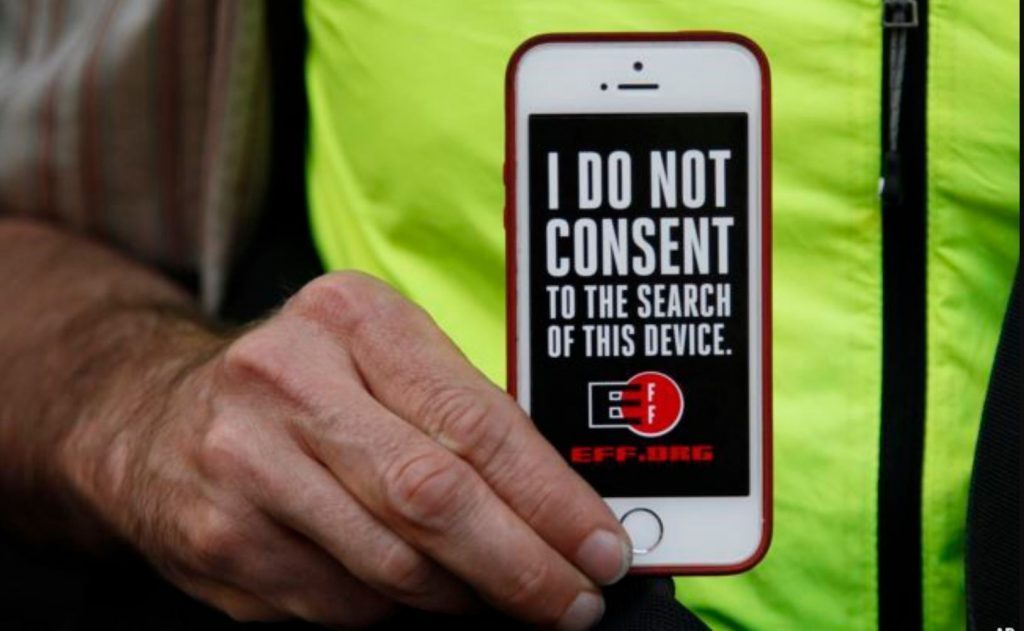U.S. Customs and Border Protection Searching Travelers' Devices At An Alarming Rate According To Gov't Watchdog
By Aaron Kesel
U.S. Customs and Border Protection officers are searching the electronic devices of travelers at an alarmingly increasing rate a new watchdog report has found, Associated Press reported.
The government watchdog -- the Office of the Inspector General for Homeland Security -- found there were 29,000 devices searched at a port of entry out of 397 million travelers to the U.S. in the year 2017, up from 18,400 the year before from 390 million travelers.
The agency further found that several searches conducted by Customs and Border Protection officers were not properly documented, and the data was not properly secured as per protocol. Some of the devices that were searched included officers looking into cloud-related content, in violation of procedures. Apparently, while officers can search a device, they are not permitted to search what’s on a traveler’s cloud network. Homeland Security is the department that oversees the U.S.'s borders.
In addition, the report noted that in some cases, under a pilot program, officers are permitted to do what's known as an “advanced” search which means a specially trained officer can download information. However, that system wasn’t maintained properly — software licensing wasn’t renewed — and some information copied to thumb drives was not deleted when it should have been, according to the government watchdog.
The watchdog recommended that the DHS maintain better documentation of searches, disable data connections before searches, keep equipment renewable and up-to-date, immediately delete data from thumb drives and develop a system to evaluate whether the pilot program works.
Earlier this year in October, Activist Post reported how this trend of "digital data papers please" was accelerating noting that New Zealand has now openly declared it as a policy.
Nicholas West writes:
Radio New Zealand reports, my emphasis added:
"The Customs and Excise Act 2018 – which comes into effect today – sets guidelines around how Customs can carry out “digital strip-searches”.
Previously, Customs could stop anyone at the border and demand to see their electronic devices. However, the law did not specify that people had to also provide a password.
The updated law makes clear that travellers must provide access – whether that be a password, pin-code or fingerprint – but officials would need to have a reasonable suspicion of wrongdoing.
“It is a file-by-file [search] on your phone. We’re not going into ‘the cloud’. We’ll examine your phone while it’s on flight mode,” Customs spokesperson Terry Brown said.
If people refused to comply, they could be fined up to $5000 and their device would be seized and forensically searched.
Mr Brown said the law struck the “delicate balance” between a person’s right to privacy and Customs’ law enforcement responsibilities.
“I personally have an e-device and it maintains all my records – banking data, et cetera, et cetera – so we understand the importance and significance of it.”
Meanwhile, in other news of tech pat-downs, Trump's administration announced earlier this year that travelers seeking a visa in the U.S. would be asked to submit their social media usernames for the past five years, under proposed rules that the State Department issued in March.
This isn’t entirely new either; the Obama administration started the collecting of social media information from select visitors of the U.S. towards the end of 2016. The Trump administration, however, further introduced tougher visa vetting last year, allowing officials to request information such as social media handles only when “such information is required to confirm identity or conduct more rigorous national security vetting.”
Since then, warrantless requests to inspect travelers' digital devices have spawned numerous of lawsuits by the ACLU against the TSA:
“We’ve received reports of passengers on purely domestic flights having their phones and laptops searched, and the takeaway is that TSA has been taking these items from people without providing any reason why,” the staff attorney Vasudha Talla told the Guardian. “The search of an electronic device has the potential to be highly invasive and cover the most personal details about a person.”
A TSA spokesman, Matt Leas, declined to comment on the lawsuit but said: “TSA does not search the contents of electronic devices.” (Source: The Guardian)
Activist Post and others previously have reported about the increase in electronic device searches for flights entering or leaving the United States. After a recent Freedom of Information Request, it was revealed that thousands of travelers per month have been subjected to these warrantless requests for personal information. Of that number, 80% are estimated to be foreigners, which still leaves a troubling number of American citizens who had their Constitution suspended with a warrantless search of their electronic devices.
What's more, this activity is expanding to include train stations under the Trump administration, as Derrick Broze highlighted. All this is on top of the agenda-driven biometrics surveillance being deployed at airports, train stations and other border checkpoints. U.S. President Donald Trump’s executive immigration order on January 27th — best known for suspending visitors to the U.S. from seven majority-Muslim countries — also included an article expediting the biometric exit program.
Aaron Kesel writes for Activist Post. Support us at Patreon. Follow us on Minds, Steemit, SoMee, BitChute, Facebook and Twitter. Ready for solutions? Subscribe to our premium newsletter Counter Markets.
